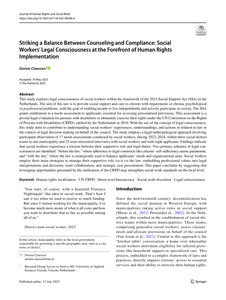This study explores legal consciousness of social workers within the framework of the 2015 Social Support Act (SSA) in the Netherlands. The aim of this law is to provide social support and care to citizens with impairments or chronic psychological or psychosocial problems, with the goal of enabling people to live independently and actively participate in society. The SSA grants entitlement to a needs assessment to applicants, essential for accessing personalized provisions. This assessment is a pivotal legal evaluation for persons with disabilities to ultimately exercise their rights under the UN Convention on the Rights of Persons with Disabilities (CRPD), ratified by the Netherlands in 2016. With the use of the concept of legal consciousness, this study aims to contribute to understanding social workers’ experiences, understandings, and actions in relation to law in the context of legal decision-making on behalf of the council.
MULTIFILE

Implementation of the United Nations Convention on the rights of persons with disabilities (UN CRPD) requires countries to harmonise their legislative frameworks with it. This paper investigates the national legislative frameworks of four Asian countries to see the extent to which they provide support services in accordance with Article 19 of the UN CRPD. The UN CRPD requires persons with disabilities to have access to and choice and control over support services. To analyse the policy alignment with the UN CRPD, an analytical framework based on the Capability Approach (CA) was developed. The results show that most countries address support services, including assistive devices, only from the perspective of a social security measure for persons with disabilities living in poverty, failing to uphold the rights of those not meeting those eligibility criteria. However, while support services are inseparably linked to social security, they also are a right for persons with disabilities. Therefore, a paradigm shift is required in the approach of support services and the distributive systems of countries, from one that addresses persons with disabilities as those requiring care considered a burden, to one that considers them rights holders with equal opportunities, for which, support services are a pre-requisite.
DOCUMENT

Most European states have ratified the UN Convention on the Rights of Persons with Disabilities (CRPD), but implementation varies at national and local levels with municipalities often playing a key role. Decentralization policies have often led to municipalities providing social support as well, but little attention has been paid to the accessibility of municipal support for persons with disabilities in the light of the CRPD. Therefore, this article presents the Dutch 2015 Social Support Act (SSA) as a case study. The SSA introduces the right to an assessment. This legal evaluation moment has far-reaching consequences for persons with disabilities as it serves as the gateway for access to reasonable accommodations under the CRPD. Dutch municipal councils implement their assessment systems in different ways, but social district teams are usually set up to execute the assessment under the mandate of the municipality. It is often the case that social workers fulfil both counselling and gatekeeping roles, despite the fact that they are not necessarily trained to combine these dual responsibilities. This article identifies impeding factors that influence the gaining of access to municipal social support at the level of the social system, the involved organizations and the individual professionals. It takes a legal-anthropological approach based on in-depth multidisciplinary interviews with experts in the field of disability rights advocacy, social policy and human rights, or with experiential expertise. The results indicate a lack of alignment between the SSA and the CRPD. The discussion gives recommendations for a broader implementation of the CRPD.
LINK